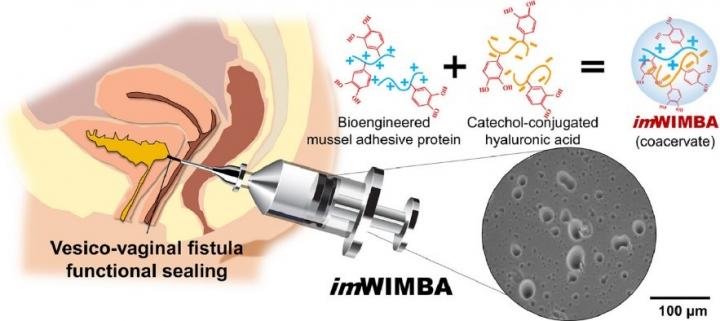
Credit: POSTECH
A Korean research team has recently developed an innovative vesico-vaginal fistula treatment method using the mussel adhesive protein (MAP) that can effectively seal fistulas in organs even when exposed to urine.
Professor Hyung Joon Cha, Dr. Hyo Jeong Kim (currently at Korea Research Institute of Chemical Technology), and Dr. Tae Yoon Park of POSTECH’s Department of Chemical Engineering with Professor Seok Ho Kang of the Department of Urology at Korea University School of Medicine and Professor Jong Hyun Pyun of the Department of Urology at Kangbuk Samsung Hospital have together improved the underwater adhesive using mussel protein and applied it to a pig model that simulated a vesico-vaginal fistula. As a result, it was confirmed that the fistula was sealed much quicker and more effectively than the conventional treatment method that uses sutures, and its treatment efficacy was proven to be superior.
Fistula refers to an abnormal opening between the organs consisting of two spaces, such as blood vessels or intestines. Among them, the bladder is in contact with various organs such as the intestine, uterus, and vagina in the abdominal cavity and a fistula here causes urine leakage that can induce serious complications such as fecal incontinence or bladder inflammation. This not only impairs the patients’ quality of life, but female fistulas are stigmatized in many developing countries, affecting the human rights and dignity of women.
Currently, a physical suture method is typically used for treating vesico-vaginal fistulas. However, this technique has multiple limitations since the surgeries are difficult and the repetitive contraction and expansion of the bladder damages the tissue, which results in delayed healing of the wound.
To this, the POSTECH-Korea University joint research team developed a formulation in 2016 that uses the phase separation property of mussel adhesive proteins to develop a water-immiscible bioadhesive that does not dissolve in body fluids like blood or urine and exhibits excellent underwater adhesion. Moving further, the researchers conducted experiments on a pig model with vesico-vaginal fistula with improved water-immiscible bioadhesive for practical applications in clinical practice.
The joint research team used a liquid-liquid phase separation formulation with thixotropy to develop the adhesive so that the high-viscosity liquid adhesive can be accurately delivered to the fistula area via a thin syringe. In addition, after the fistula is sealed, it is designed so that it does not flow out or fall out of the fistula.
The researchers confirmed that by maximizing the concentration of catechol – which acts as an important functionality in underwater adhesion – the stability of the adhesion is increased even more in the presence of body fluids. It was also confirmed that the fistula’s closing force continued to be maintained in the bladder, an organ that repeatedly contracts and expands, thanks to the flexible property of a protein-based adhesive, and the protein adhesive biodegrades and the fistula naturally regenerates.
With no immune response or inflammation observed around the sealed fistula, low surgical difficulty, and easy access to large quantities of materials, the adhesive is anticipated to be used widely in developing countries with poor medical facilities. The water-immiscible mussel protein-based bioadhesive (imWIMBA) has undergone a technology transfer to Nature Gluetech Co., Ltd. and is currently being commercialized.
“We have confirmed the mussel adhesive protein – a technology that originated in Korea – as an effective vesico-vaginal fistula treatment method by applying it to an actual vesico-vaginal fistula of a large animal model,” explained Professor Hyung Joon Cha of POSTECH. “It is anticipated to be successfully applicable to fistulas and perforations in other similar environments.”
“Vesico-vaginal fistula is a disorder difficult to treat and it significantly impacts the patient’s quality of life,” remarked Professor Seokho Kang of Korea University. “We expect the newly developed treatment method to be applicable to minimally-invasive surgical methods such as robotic surgery and endoscopic surgery as well as open surgeries in the future based on its excellent water-immiscibility and underwater adhesion.”
###
The research findings were recently published in Acta Biomaterialia, an international journal on biomaterials. The research was supported by the Korea Health Industry Development Institute funded by the Ministry of Health and Welfare of Korea, the Industrial Core Technology Development Program funded by the Ministry of Trade, Industry and Energy of Korea, and as part of POSCO’s strategic program.
Media Contact
Jinyoung Huh
[email protected]
Original Source
https:/
Related Journal Article
http://dx.




